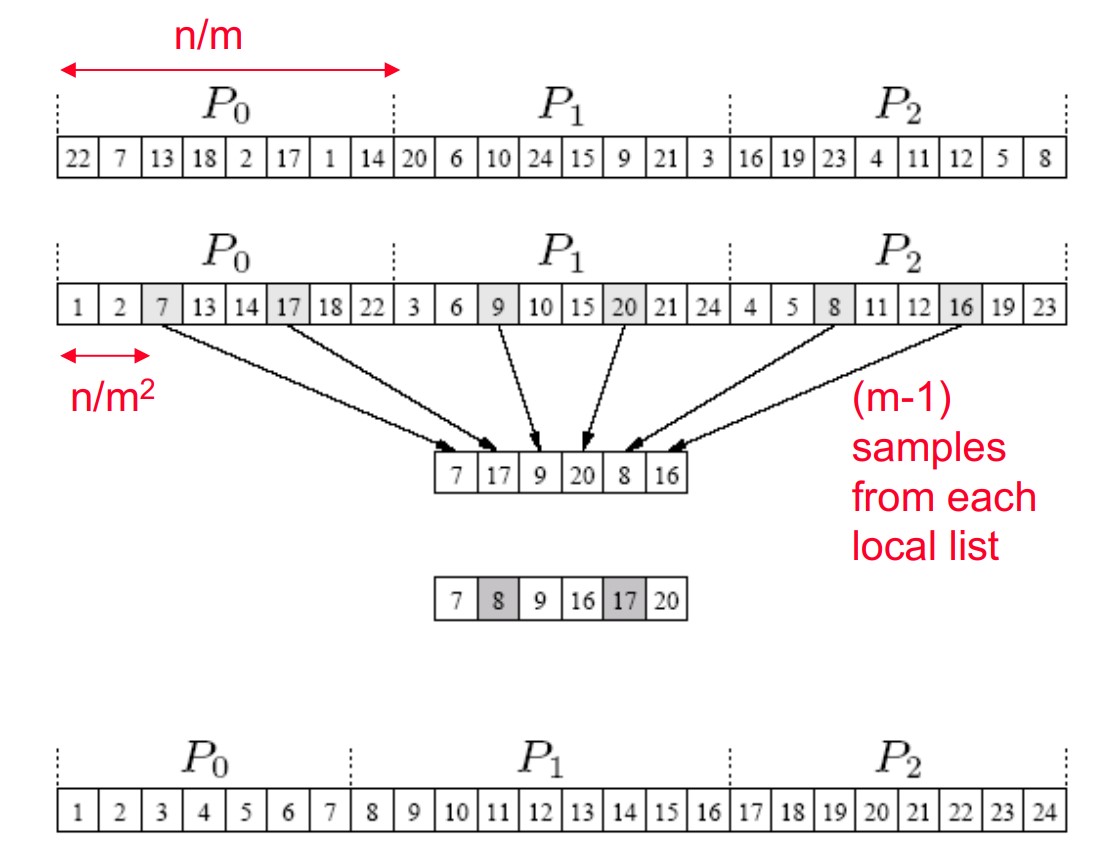Parallel Searching and Sorting
Master Theorem for Recursions
A quick recap for the time complexity of recurrence algorithms. Let \(T(n)\) be the time complexity of a problem of size \(n\), \(b\) be the number of sub problems in the recursive step, and \(f(n)\) be the time for the non-recursive part. Then a recursive algorithm's running time can be expressed as
Then, we have
- \(f(n) = O(n^{\log_b a - \epsilon}), \epsilon > 0 \implies T(n) \in \Theta(n^{\log_b a})\).
- \(f(n) = O(n^{\log_b a \lg^k n}), k \geq 0 \implies T(n) \in \Theta(n^{\log_b a} \lg^{k+1}n)\).
- \(f(n) = O(n^{\log_b a + \epsilon}), \epsilon > 0 \implies T(n) \in \Theta(f(n))\) (with regularity condition).
Example cases: binary divide and conquer problem such as merge sort, binary search is
K-th Largest Element
Task: find the kth largest element in a list of length \(N\), often used for finding median or quartiles. An easy (and relatively efficient) algorithm is quickselect, basically similar to quicksort, pick a pivot and subdivide the problem to larger than and smaller than. Then, depends on the position of \(k\), go to one of the subproblem. The average time is \(O(n)\) and the worst case is \(O(n^2)\), each time picked an extremum within the current array.
Median of the Medians
Based on quickselect, but guarantees worst case linear time.
Note that \(O(7n/10)\) comes from excluding at least \(O(3n/10)\) elements. Therefore, by Master's Theorem, the total time is
Weighted MoM for Parallelism
Based on the algorithm, a simple idea is to let each processor compute a local median, gather and find the global median of medians, then discard elements and recurve. However, if the array is not evenly distributed, then the global median of medians is not held. Therefore, after each recursion stack, we need to redistribute arrays to make it even, which takes large amount of communication.
Define the weighted median of the medians by given \(p\) distinct elements \(m_1,...,m_p\) with corresponding positive weights \(w_1,...,w_p\) s.t. \(\sum_{i=1}^p w_i = 1\), the weighted median is the element \(m_j\) s.t. \(\sum_{i:m_i < m_j} w_i\leq 1/2 \land \sum_{i:m_i > m_j} w_i\leq 1/2\).
The recursive step is \(O(3n/4)\) because the weighted median guarantees that we are discarding half of the elements that's smaller than respective local median, and by median of medians, that's \(1/4\) in total.
Merge Sort for Shared Memory Model
def P_mergesort(arr):
n = len(arr)
if n == 1:
return arr
arr_l = P_mergesort(arr[:n//2])
arr_r = P_mergesort(arr[n//2:])
return merge(arr_l, arr_r)
merge takes \(O(n)\) time, thus we need to parallelize merge as well. def P_merge(arr1, arr2):
""" arr1 and arr2 are both sorted
return sorted arr1 + arr2
"""
if len(arr1) < len(arr2):
arr1, arr2 = arr2, arr1
if len(arr2) == 0:
return arr1
mid1 = len(arr1) // 2
# binary search for the index s.t.
# arr2[:mid2] are smaller than arr1[mid]
mid2 = bisect(arr2, arr1[mid1])
return P_merge(arr1[:mid1], arr2[:mid2]) + \
P_merge(arr1[mid1:], arr2[mid2:])
Sorting for Distributed Memory Model
Bucket Sort
Assume that we have the range of the data, then we can partition the range into \(p\) intervals. Each interval will corresponds to one proc, or one "bucket" that holds all elements fall within the interval. Each processor runs through its local list and assigns each of its elements to the appropriate "bucket" (communication required). Then, each processor can sort its own bucket and finally gather all elements.
The main issue with bucket sort is load imbalance, it's hard to pre-decide the interval partitions.
Sample Sort
Sample sort aims to solve the load imbalance issue with bucket sort. 1. scatter the global array of size \(n\) into \(p\) procs, each with size \(n/p\). 2. Each proc sort the local array 3. Select \(p-1\) evenly spaced samples from local array. 4. Gather the \(p(p-1)\) samples, sort the pivots array, and select \(p\) evenly spaced samples from the pivot list. 5. Use the \(p\) samples as interval to define the buckets.
We can guarantee that each bucket has at most \(2n/p\) elements.

